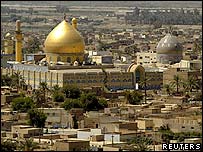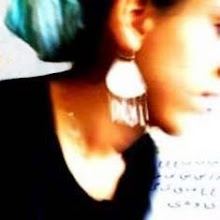The Rap on Race and Identity PoliticsThere's been quite a bit of blogging around the politics of race and identity vis-a-vis notions of solidarity, discourses of racism, etc. I want to add my two cents...
I identify as a light-skinned woman of color. Lighter Shade of Brown (LSB) as my sister calls it. I have an olive tone that pales in comparison to some of my sisters of color. I have privileges because of this paleness, I know this. I also have
complex negotiations of this understanding...afterall, I am not white. I don't identify as white.
The story I want to share with you is one that is close to my heart. It's the beginning of those complex articulations of identity and the discourses of race and racism that took place far before I identified as a "radical, woman of color", far before I had the tools (i.e. academic jargon) to articulate my experiences and those of the loved ones around me.
After moving to Canada in '87, my family settled in a predominantly WASP (white anglo-saxon protestant) neighbourhood, where having an "
eye-ranian" family as a neighbour wasn't taken too well. Of course, in the proper bourgeois, Victorian manner of vancouverite wasps, the racism was never overt, but subtle in its cruelty...it stung nevertheless.
Dealing with cultural gaps and language barriers, I became a bit of a loner, watched a lot of TV (which helped my English!) and had few friends for the remainder of the elementary school years. I was the FOB girl who the "cool" kids teased but were equally fascinated with (i.e. did you ride camels?). Of course, no boys crushed on me, unless they were asking me out as a funny joke (or a dare, as it happened on one occasion).
I moved on to junior high school and realized I
had to fit in. I was tired of being anti-social, there was so much of me to share with people. At this point, I had become close with a couple of Iranian girls (who had lived in Canada longer than me) who helped "de-Fob" me...showed me the path to "assimilation." We breathed the same need/desire to fit in, albeit we exhaled it differently. We ended up in different cliques in different parts of town, however, each of us having to deal with a lot of privileged white kids.
At this point in time, I became obsessed with "coolness" and tried fitting in within a group of very (very) privileged white girls at my pre-dominantly white school. Went through brief phases of rock, grunge and folk/hippie...all the while, not relating! I didn't get them, and I knew they wouldn't get me (if they'd gotten to know the 'real' me, that is). I didn't look like them, they didn't look like me. They didn't carry the "ethnic baggage" I did. They didn't wear the ethnicity I wore (no matter how hard I tried to hide it).
This is where music played a crucial role in my life. From my b-boying cousins in Iran and my "canadian" cousins who listened to Public Enemy, NWA, BDP and EPMD, I was well aware of the grassroots culture of resistance that cultivated Hip Hop music. This is the time when Hip Hop wasn't as trendy and commercial, when whities hadn't fully caught on yet but were slowly beginning to.
Inevitably, I gravitated towards the Hip Hop scene...all ages jams, shows, concerts, tapes, tapes and more tapes (I'm talking pre-CD era of 1990). I entered a space where whiteness was challenged. It was a space for people of color, made by people of color - namely, Blacks and Latinos. It was (is, and always will be) a space
owned by people of color. This space invited me in, welcomed me and allowed me to belong (as much as I could). Dope beats and rhymes, graffiti and breaking became the tools to articulate politics of identity, race, racism, oppression, privilege...
Your ethnicity (particularly how you wore it in terms of skin color, features, etc.) was at the core of this scene I grew up in. If you were ambiguously brown like me, then you often got the "What are you?" question: "hispanic?" "half-Indian?" "Arab?"
The farther from white, the more legit your presence in that space. That's how it was. A radical space where white kids were challenged...they were called out on their privilege...they had to "prove" themselves worthy to be in that space.
Mind you, I've shared with you my particular experience of a particular era in a particular city. Unlike Toronto (where I am now), Vancouver is a city which reeks of middle-class whiteness. Also, this was a time when the race politics were
much much much more overt in rap music.
I still say it, Hip Hop is a space created by people of color for people of color: a grassroots culture of resistance through artistic expression. White folks were/are welcome to this space but they did not/will never have ownership over this space. White hip hoppers (i.e. nerd hopping, back-packer white boys/girls) need to recognize their privilege in terms of owning dominant spaces in society and how those spaces actively, systematically exclude people of color. This is how they should enter the space. White people also need to recognize the roots of this culture and how, and by whom, it came to exist. This is how they should take part in the space.
Anyway, just ranting away...
I guess all this partly came out of the fact that I missed an incredible show with M1 (from Dead Prez) and other talented conscious artists. A group of us went down there, and found that tickets were sold out. What sucked though wasn't just not getting in, but watching a crew of white activists (I'd done union activism with) get in to the show. These were the same white folks who, a while back, attempted to silence me for calling out their racism/sexism within the activist, union space. The bitter irony of watching them get into the show, and not me, stung man, it really did.
Oh well.
Es la vida, no?
PQ
 Divide and Conquer
Divide and Conquer


